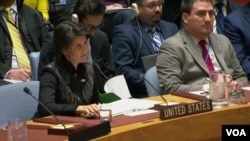The U.N. Security Council met to discuss Syria Monday, amid new reports of possible chemical weapons use in that country.
“We have reports that the (Bashar al) Assad regime has used chlorine gas against its people multiple times in recent weeks, including just yesterday,” U.S. Ambassador Nikki Haley told council members. “There is obvious evidence from dozens of victims.”
Medical groups and first responders in Syria reported several civilians had signs consistent with chlorine gas, including breathing problems and the smell of chlorine on their clothes, after a reported chemical attack on the town of Saraqeb in Idlib province late Sunday. No fatalities were reported.
Radi Saad of the civilian defense group, the White Helmets, told Reuters news agency that the chemicals were dropped in two barrels from helicopters. Rebel-controlled Idlib is one of four so-called de-escalation zones. But fighting has been fierce there since December, as the Syrian army, backed by Russian jets and Iranian-supported militias, have conducted a military offensive to take back a major rebel stronghold.
On Saturday, rebels there shot down a Russian fighter jet, killing the pilot.
Accountability
In 2015, the U.N. Security Council established an independent joint investigative mechanism (JIM) to examine who is responsible for previous chemical weapons attacks in Syria. The JIM found the Assad government responsible for using chlorine at least three times in 2014 and 2015, as well as for a sarin attack on the town of Khan Sheikhoun in April 2017.
The Syrian government has denied using chemical weapons. Russia rejected the team’s findings, and in November vetoed an extension of its mandate, effectively shutting it down.
“It’s a true tragedy that Russia has sent us back to square one in the effort to end chemical weapons use in Syria,” Ambassador Haley said Monday. “But we will not cease in our efforts to know the truth of the Assad regime and ensure that that truth is known and acted on by the international community.”
Russian envoy Vassily Nebenzia accused the United States and its allies, France and Britain, of using the meeting to “slander” Moscow and cast doubt on its role in trying to broker a political settlement in Syria.
“These statements of these representatives, as always, contain very little truth mixed with mountains of lies,” Nebenzia said.
He dismissed the recent allegations of chlorine, and possibly even sarin use, as propaganda spread on social media and taken up by Western media outlets.
“Where is the presumption of innocence?” Nebenzia demanded, saying an investigation under the auspices of the Organization for the Prohibition of Chemical Weapons (OPCW) should carry out a fact-finding mission before council members point fingers of blame.
Last April, the Trump administration launched 59 Tomahawk cruise missiles at the Al Shayrat air field, the base the Syrian air force used to carry out the Khan Sheikhoun attack.





